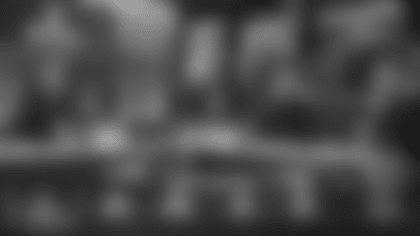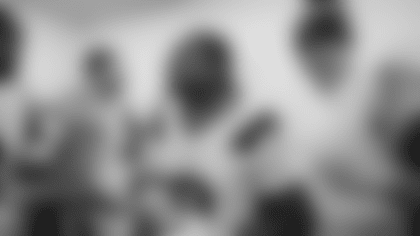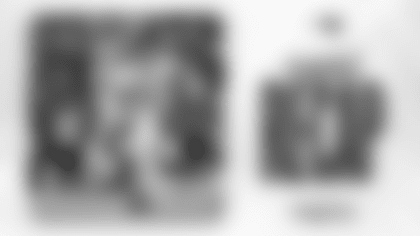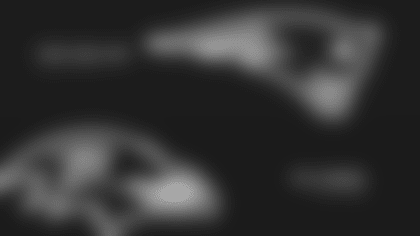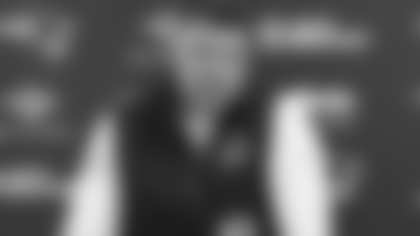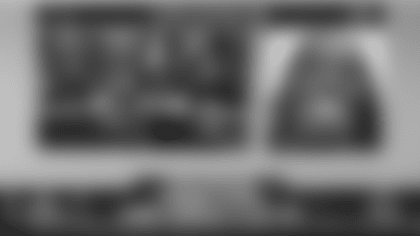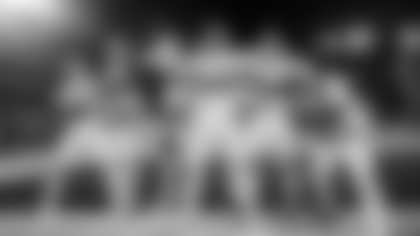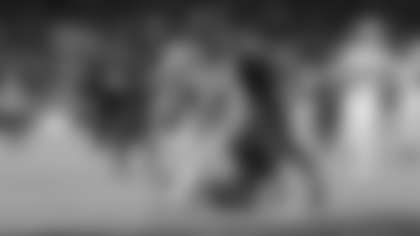[

]()
**B:** This will be our first day in the bubble today, if you need a note for your story.
Q: How important is this game, it is not a division game, but because of the start you had does it take on more importance?
B: Sure, I think each game through the year really becomes more important and of course the division games have a little extra importance there, but we can't afford to get into too deep a hole, we are already in one. We can't afford to dig too much deeper. There are only 16 games in the NFL, it's not like baseball. Each one is starting to take on a little bit more.
Q: Is there a line you walk with your players on the one hand this is a big game, but on the other hand giving them the impression that you are chewing your fingernails down to your wrist?
B: I think everybody understands that. We can all go through the teams that start off slow and finished up with good seasons and we can all go through the teams that started fast and didn't finish up well. There are going to be some of those teams every year one way or another and we know that. There isn't anything that we can do about the first two games all we can do is focus on Minnesota and that's where our attention is. We have all been on teams that didn't start off well and played well later. Two games don't make or break a season one way or the other, but it certainly would be a lot better to be 2-0 than 0-2, but that ship sailed. We are what we are.
Q: Is John Randle someone who lines up in different spots, they have him listed as UT, do you know what that means?
B: Yes, under tackle. They basically play an under defense which means that the line is shifted away from the tight end and on an over defense the line shifts to the tight end. Usually when you do that what most teams do is they out the same guy on the nose and then they flip the tackle so if they are under or over then the one guy moves and then they adjust the linebackers. So it is an under tackle, that means he usually plays between the guard and the tackle away from the tight end. He can line up in some different spots. If it is an over then he's on the other side and they have played him at end in the past, but basically that is his position.
Q: What is the philosophy of playing under or over, 4-3 right?
B: Yes. There are a lot of different things to take into consideration. I think most defenses in this league have to start with pass coverage. Then from pass coverage I think you basically work down to the running game. Not to put one over the other, but just in terms of building a system you have to adjust to so many different formations and so many different offensive systems throughout the course of the season that there are basically more problems in the coverage games then there are in the run game. What the under gives you is a linebacker at the end of the line of scrimmage. Any time you have a linebacker at the end of the line of scrimmage it is a lot easier for him to adjust out than it is if the linebacker is inside over the tackle. You don't want to adjust the defensive lineman out so by playing an under front you can adjust the linebacker at the end of scrimmage. The way Minnesota plays their coverages and the way Emmitt (Thomas) did it in Philadelphia and when he was at Green Bay, that has kind of been his system to be more of an under front and because he has certain coverages that he plays from that front and without being in that front it makes it hard to play those coverages. I don't want to speak for him, but that is my sense of it.
Q: Your point being that all of your offensive linemen have to be leery of him because they might see him at some point?
B: He primarily plays inside of the tackle between the center and the tackle area, but we know in the past he has played, whether they will use him a lot at end in this game I really don't know, but his basic position is inside. To answer your question though yes because the number of games that they run and stunts that even though he lines up in one spot a lot of times he loops across the ball or loops outside so eventually everybody will end up on him, right.
Q: John Randle is famous for talking a lot, how much does that effect guys does it serve as a catharsis out there or can he get under a young guy's skin?
B: I think I have seen it have both positive and negative effects. Sometimes I have seen it motivate other players and stimulate them and it has probably sent some of them a little bit into the tank. I would say through the course of the years I have probably seen it go both ways.
Q: Is that a concern at all with some of your younger lineman?
B: Hopefully anything that happens out there will be positively focused for us, but I think there are a lot of other things on the list higher than that, let's put it that way.
Q: Has Otis (Smith) become your top free safety, is he ahead of Tebucky (Jones)?
B: It depends on what package we are in. We basically have played, for the most part, five defensive backs with Ty (Law), Lawyer (Milloy), and Antonio (Langham) usually being three of those and then either Tebucky or Otis being the fourth and or fifth when there are five in the game. It depends a little bit on what we are playing and how we are playing it, who is in there more than, this guy is in there or that guy is in there, it depends a little bit on the defensive package that we are in.
Q: Did he do that for you in New York?
B: In New York he was pretty much a corner.
Q: Has he just reached that point in his career where he is better off there?
B: No, I think it is just the mix of our team right now. What we see and what we face and we have done that from time to time anyway. We have taken a corner, like at New York we at times would take a safety out of the game and put (Ray) Mickens in to give us three corners and one safety and that is not state secret. We have done that type of thing before. It depends on what you are facing and how flexible you want to be defensively. Three corners in the game gives you a certain amount of flexibility one way, but it takes away from something on the other side. On the other hand two safeties give you a certain amount of flexibility in that they are somewhat interchangeable, but if your safety can also play corner then that gives you another changeup. It really depends on what we are trying to do.
Q: Is Antonio still the starting right cornerback?
B: Again it depends on what the package is and what the call is. No question he will play cornerback, yes.
Q: What about his confidence, I had read about it that after he signed that big contract with San Francisco he lost his confidence, did you see that, have you seen that?
B: I wasn't there, but since he has been here I haven't seen it.
Q: You have spoke to him, do you have any sense that he has lost his confidence somewhere along the line? Clearly he is in position to make plays he is just not doing it?
B: Since I have been with him here, since May or whenever it was, no. I think he feels confident in what he is doing here. I think he feels confident in his technique and what we are asking him to do. No I don't get that sense. I can't speak for what has happened in other years when I wasn't with him, but I don't get it now, no. I am sure he is frustrated, I mean I know he is frustrated just like the team is frustrated. He has had a couple of opportunities when he has had good coverage on the receiver and been right there and has made some plays and then there are a couple that he didn't make. That's the life of a cornerback and that's the life of a quarterback too. There are going to be some close ones that you are going to make and some that you are not going to make. As a real competitor you want to make them all. You want to complete every pass and you don't want any caught on you. Those are the kind of positions that quarterbacks and cornerbacks play. They are only involved in a selected number of plays, but they are magnified. That's part of the job description.
[

]()
**Q: Besides being able to score a touchdown what makes a team good or bad in the red zone? Is it specific things like a big powerful running back, wide open receivers, historically have you seen one particular team that is better in the red zone because of a certain element that is present?**
B: Yes I have, but I don't think that it is the same element all the time. Again you can site different teams through the last ten or fifteen years that have been very successful in the red area and have scored a lot of points and they don't necessarily all do it the same way. San Francisco was a good example of a team that threw the ball a lot more than they ran it and put a lot of points on the board. The Redskins under Joe Gibbs ran it a lot more than they threw it and they put a lot of points on the board. Minnesota a couple of years ago when they led the league in scoring they actually probably had a lot more big plays and weren't in the red area as much because they just threw over it and had big plays that went through it, but they set the league record in scoring 560 points or whatever it was. I think one of the teams that has led the league in the red area the last four or five years has been the Redskins and they have probably done it a little bit more with the running game. There has got to be some degree of balance don't get me wrong, but if you want to say one or the other, but whatever it is you need to be efficient and things in the red area just happen a lot more quickly than they happen out at mid-field. You have less space, the holes open and then it closes because there is somebody there and they are not playing as deep, or if a guy is open or a receiver is open and there is not much space to get the ball into because the defense is defending 20 yards instead of defending 70 or 60 or whatever it is. Everything is tighter down there and there is less margin for error on both sides of the ball. Defensively it is the same thing. You can have good coverage on a receiver out on the field and the ball has to travel farther, but down there in the red area where it is a short pass coverage has to be even tighter. It is just a much quicker, more precise, less margin for error area of the field. Just an inch or two, a foot makes a huge difference.
Q: Is it particularly difficult if you do not have a big powerful back and a quarterback that doesn't move well? Does that make it even maybe more difficult down there?
B: I think you take the strengths of your team whatever they are and you try to maximize those. If you have a quarterback that can throw the ball well and make a lot of different throws and throw to different areas of the field then you can do that and you can still attack the whole field down there. If you have a big, powerful inside runner and he can push the pile and gain two or three extra yards on his own then that is the kind of guy that you want to feature.
Q: Is it a mentality that these guys have to feel more confident or is there such a thing as a confidence loss because they haven't been able to do it successfully?
B: I don't think the confidence is lost, actually I think the confidence is going to increase as the team understands and gets a better understanding of exactly what we need to do and exactly how it needs to be done and when it is done that way that it will be successful. I really think our confidence down there will increase in the coming weeks. Things that we have done down there, we have been close, but again it's just a couple of inches or a foot or just a little bit quicker, had it happened a little quicker then what it did I would have been in there. I think that we can see that, I'm sure that we can see it and I think that we are going to have to understand that this is the way that it need to be done. I see the players making an effort to do it and it has been emphasized all week. I think the execution has been better in that area of the field in practice as it should be given the amount of time that we put into it. I think that is going to show up in the games.
Q: What percentage of time did you spend on that this week in practice?
B: I don't know what the percentage is, but probably about two and a half or three times as much as we normally would.
Q: Last week you had Michael Bishop as the third quarterback, do you just feel that you don't need him early in the game?
B: It is a question of what is best for your football team. Right now we have two quarterbacks in John (Friesz) and Michael (Bishop) who both have very obvious strong points and they bring certain things to your team and certain things to the game when they are on the field, but they are very different from each other so it is not like they give you the same thing. They both give you something, there is no question about that, but it's not the same. Then you just have to decide what's best for your football team given all the things that you want to take into consideration, all the things that could happen, why they would be in the game. Either by your choice or by a circumstance that would force you to put them in the game and that's what you have to decide. Again the third quarterback is not excluded from the game as we have seen the last two weeks. He is excluded from three-quarters, but you can still do the same things with whoever the third quarterback is. You can do the same things every game it is just the time when you can do them. That is the decision that we will make every week and what is best this week against Minnesota may not be what's best last week against the Jets. I can't say for sure every week this is what it is going to be because I think that the situation could change.
Q: You have been popping him in for a couple of plays the last few weeks, is that hard on him to just come in for one play and to never get a rhythm going?
B: I don't know, but that's what it is, that's what it is going to be. I don't think we are going to be in a situation where we are going to take Drew (Bledsoe) out and put anybody in for a quarter. Right now that is not what we are looking at.
Q: How about down near the goal line?
B: Nothing is out, it is just that if he is the third quarterback then it is out until the fourth quarter. If he is the second quarterback he can do it at anytime if you feel like that's something that you want to do. We have done it a couple of times this year, sometimes it has been successful, and sometimes it hasn't. We scored one time I think when he was down there. We had three or four plays with him in there and then there were a couple of times on a two-point play where we didn't. Maybe four plays and we scored once and didn't score three times, whatever it is and if you are going to do that then you are going to have to commit the time to it and that's where you want to put your emphasis and if you are not going to do it then it is probably a poor allocation of time to commit a lot of time to it and then not do it. So that is kind of the situation that we are in there. Not that we don't want to have that, but in the last two games by having that available to us then that would have put us in another situation had we had to change our first quarterback.
[

]()
**Q: But when you are having red zone problems does he pop into your head more that maybe he could be a possible solution to it?**
B: Sure it is a possible solution.
Q: How did Miami defend Minnesota last week?
B: They played the receivers deep, very deep. Minnesota, they move the ball up and down the field. They had four turnovers. They had three interceptions and (Daunte) Culpepper got stripped down there on the ten or fifteen yard line so it wasn't really a case of Minnesota not moving the ball, but it was a case of Miami not allowing Minnesota to score very many points. Depending on how you want to look at it, that was a result, I am sure Minnesota feels like they should have scored a lot more points. I am sure that Miami feels like they did a good job of holding them to 13, which they did.
Q: Did they play them a lot differently than Chicago did?
B: Yes, but I mean Miami's style of defense is different than Chicago's style of defense. I think it would be hard for either team to duplicate the other. That is just not the way Chicago plays, they just don't play like Miami and Miami just doesn't play like Chicago, but I think both teams were concerned about the threat of the receivers and the quarterback and certainly scrambling was an issue. It was clear that both teams took an effort to control it but still (Daunte) Culpepper got out of there and made some effective plays.
Q: Was part of the approach to make them play a lot of plays, in hopes that they would make some mistakes?
B: No question, but I don't think it was their intention to have them get the ball on the 20 yard line and drive it down to the fifteen, play a lot of plays that way. You always want to go three and out or get a turnover, but I don't think there is any doubt about it. The worse thing that can happen is for them to go out there and score on one play. At least if you are lining up for a consecutive number of plays eventually you have a chance to stop them or something will happen, you will make a play or somehow or other the drive will end, but if it is one pay and then it is all over then it is too costly a mistake. They are where they want to be, they are in the end zone and they got their points. That is definitely where you don't want to be. You don't want these guys having three or four long touchdown plays against you in the game. That is not the way to win.
Q: When you look at the Miami defense and they forced all these turnovers, do you look at that as a plus or minus, this guy is capable of turning the ball over a lot or do you look at it and say, 'Geez this guy is driving down the field like crazy'?
B: I think if you watch Minnesota play you are going to find a certain number of plays in every game where the defense had a chance to get a turnover there. Just because Moss is covered doesn't mean they are not going to throw him the ball and you are going to look at that play and you are going to say, ' Geez the defense could have got a turnover on that play.' You are also going to say, 'Wow what a catch Moss just made. There is 50 yards right there, he was covered but so what, he has got a better chance to come up with the ball then the other guy.' And there are going to be some of those plays in the game. There are going to be those kind of plays to Cris Carter too. The coverage is going to be good and the ball is going to go in there anyway. If you watch Minnesota play you are going to see some of those plays turn into turnovers, some of those plays are going to turn into great catches and big plays and that is kind of the way they play. And they have made a lot more big plays then they have turnovers, but in the Miami game a couple of times (Daunte) Culpepper tried to force the ball in there and Miami was able to come up with it. But there are plenty of other times when he forces it in there and it's fifty yard gains too. I'm not saying that he shouldn't have forced it in there, because if they hadn't forced it in there some other times they wouldn't have got some of the plays that they got against Arizona and San Diego, even the preseason, but the big plays that they have a lot of times it's just the confidence that the receiver is going to come up with the ball and quite often they do.
Q: Is that what happened on that play to (Randy) Moss, I think he scored a touchdown and (Sam) Madison was all over him?
B: Right, you could go to that play and say to the quarterback, 'Gee you shouldn't be throwing the ball into that tight a coverage and they get a touchdown out of it. Two series before that you could say the same thing, 'Shouldn't have thrown the ball into that coverage,' and it gets picked off, but that's the kind of way they play. They are aggressive, they put the ball in some tight spots. It is going to result in some big plays for them and eventually the ball is going to end up in the hands in the defense at some point or other. It is pretty clear that they are willing to accept the trade off. Three or four touchdowns for an interception, or whatever they think it is going to be.
Q: Does that mean that you have to talk differently to your secondary, 'these kinds of things are going to happen'?
B: No matter how well you have got them covered expect the ball. Just because you are standing right next to the guy and he is not open doesn't mean the ball is not going to be thrown. A lot of times that is what that means. A lot of times a defensive back can feel like, you know when you have got the guy covered and you know the quarterback is not going to throw the ball and you know when he is not covered he is going to throw the ball, you know what I mean? But in this case it is a situation where I don't care how tight you're on the receiver that ball could still be coming in there, especially to those two guys, Moss and Carter.


